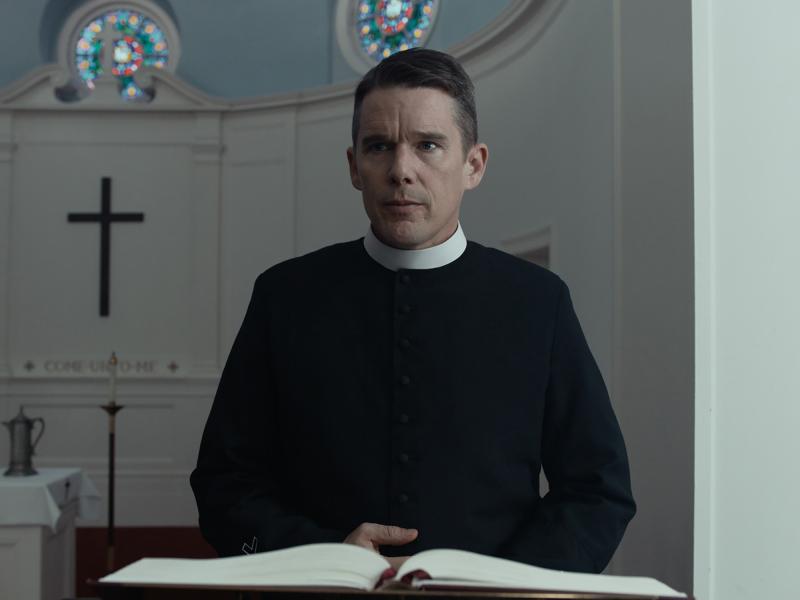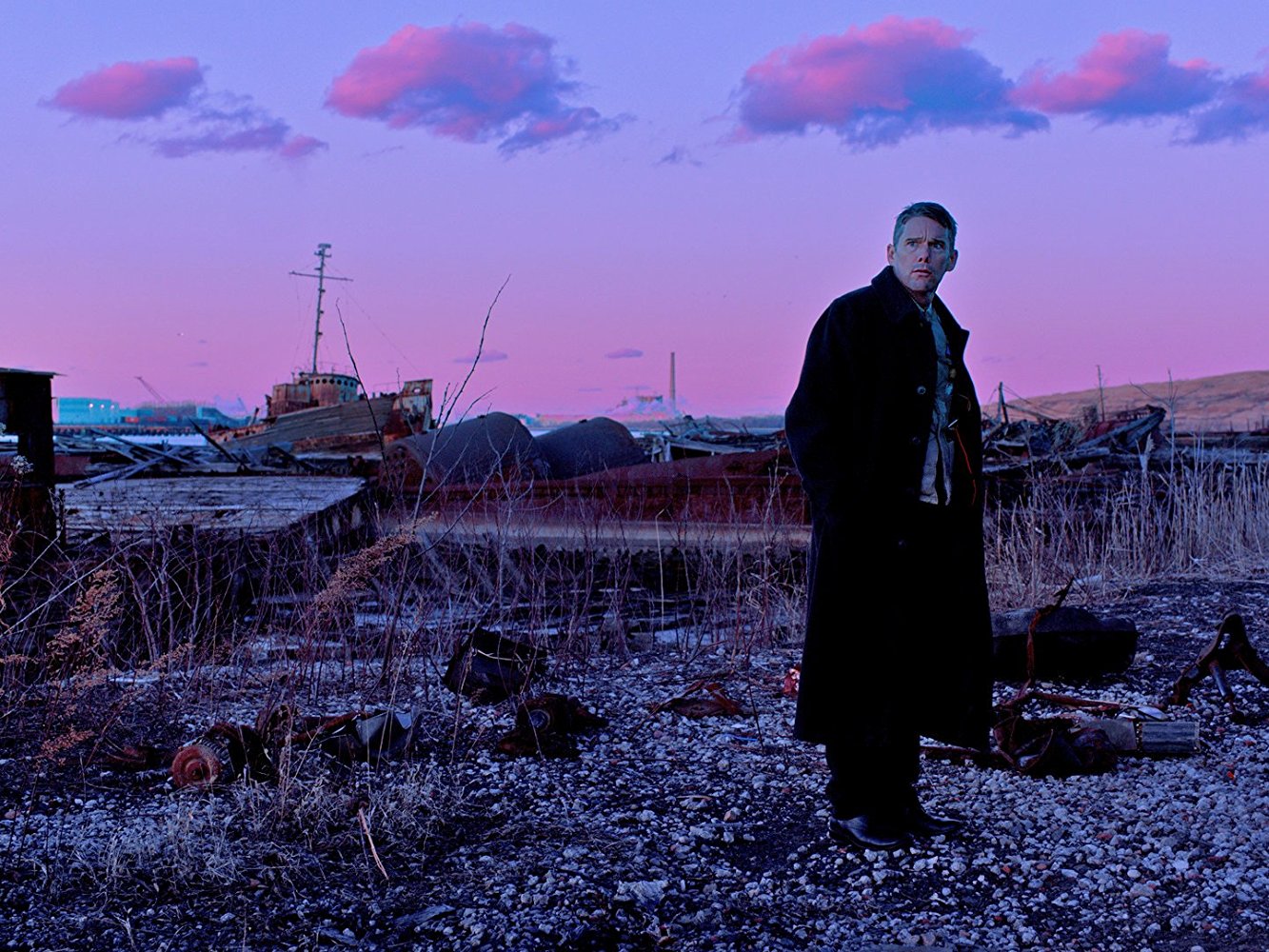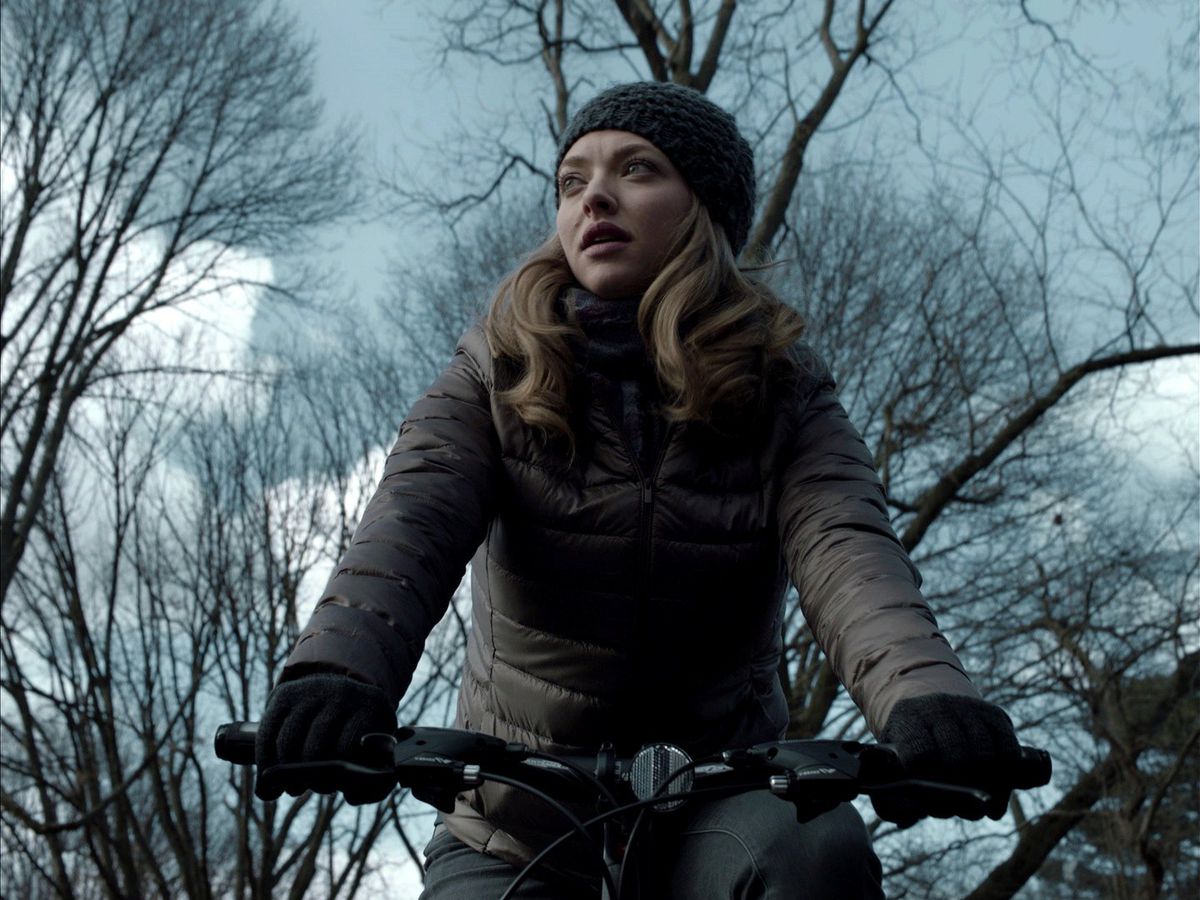First Reformed - faith fights the eco-apocalypse | reviews, news & interviews
First Reformed - faith fights the eco-apocalypse
First Reformed - faith fights the eco-apocalypse
Hawke and Seyfried search for divine light in Paul Schrader's austere parable

Father Ernst Toller (Ethan Hawke) calls himself one of God’s lonely men. The term given to Paul Schrader’s anti-heroes since Taxi Driver’s Travis Bickle is usefully explained by the priest: his loneliness is a divine attribute letting him sympathise with fellow sufferers. Take one look at Hawke’s face, though, which seems sucked into hollow-cheeked, unnatural nobility, and it’s clear few need help more than him.
First Reformed’s opening shot dollies towards a looming clapboard church which predates the United States. The state of the nation and planet still seeps into what has become a tourist relic, with a congregation of a half dozen on the day Mary (Amanda Seyfried) asks Ernst for help. This former military chaplain’s position already seems a form of penance, after losing the son he encouraged to serve in Iraq.
 Mary’s atheist, eco-warrior husband Michael (Philip Ettinger) wants her to abort their baby, rather than bring it into a world he sees as doomed to climate apocalypse. In one of First Reformed’s most nervily great scenes, Schrader’s camera observes for perhaps ten minutes as these two men sit and debate faith in life versus despair with heady intellectual rigour, and Michael’s fate clearly in the balance. Ernst is “exhilarated” as he’s raised from the stupor of parish chores to feel like Jacob wrestling the angel.
Mary’s atheist, eco-warrior husband Michael (Philip Ettinger) wants her to abort their baby, rather than bring it into a world he sees as doomed to climate apocalypse. In one of First Reformed’s most nervily great scenes, Schrader’s camera observes for perhaps ten minutes as these two men sit and debate faith in life versus despair with heady intellectual rigour, and Michael’s fate clearly in the balance. Ernst is “exhilarated” as he’s raised from the stupor of parish chores to feel like Jacob wrestling the angel.
The film asks questions which both secular and religious communities are uncomfortable answering. But when the despairing eco-idealist and the damaged priest meet, their similar commitment sparks ideological fission, and Ernst goes into meltdown. Mary’s discovery of Michael’s Jihadist-style suicide vest, and Ernst’s of the complicity of his slick mega-church bosses with an ecologically criminal owner, accelerates his crisis.
Schrader’s career since the Oscar-winning Affliction (1997) has resembled a losing guerrilla war, in which his improvised tactics merely let him survive till the next defeat. His previous film about a priest, the Exorcist sequel Dominion, saw Die Hard director Renny Harlin humiliatingly hired to reshoot it. Similar hackery befell Dying of the Light, while Bret Easton Ellis and Lindsay Lohan joined him in the pornographic twilight of The Canyons, a zero-budget autopsy on all their Hollywood careers. Artistic successes which escaped this fascinating period, Auto Focus’s untypically gaudy biopic of a falling TV star among them, went unseen. First Reformed is his first screenplay to reach the screen unscathed in a decade, and shows an artist strengthened by the fight.
 The upstate New York setting and Alexander Dynan’s bleached-grey cinematography suit the austere Calvinism of Ernst and Schrader’s upbringing, into which red-coated Mary brings sensual life. The director’s devotion to Robert Bresson’s stylistic simplicity is his clearest display of faith. Ernst unceremoniously walks out of the corner of static, square-framed scenes, and Lustmord’s dark ambient score is silent between the ominous opening and last-reel unravelling.
The upstate New York setting and Alexander Dynan’s bleached-grey cinematography suit the austere Calvinism of Ernst and Schrader’s upbringing, into which red-coated Mary brings sensual life. The director’s devotion to Robert Bresson’s stylistic simplicity is his clearest display of faith. Ernst unceremoniously walks out of the corner of static, square-framed scenes, and Lustmord’s dark ambient score is silent between the ominous opening and last-reel unravelling.
The startling transcendence Schrader then dares twice during Ernst’s manic lunge for redemption is unnatural to his hair-shirt style, but necessary. Staying with his initial tale of a priest doggedly trying to do right amidst subtle corruptions would perhaps have been still braver than his late, screeching turn into melodrama.
The over-certain, commodified America in which Ernst tries to be pure and good is anyway integrated into a story which the fine cast keep painfully human. They help turn Schrader’s Jacob-like grapple with life’s potential into one of his greatest successes.
The future of Arts Journalism
You can stop theartsdesk.com closing!
We urgently need financing to survive. Our fundraising drive has thus far raised £49,000 but we need to reach £100,000 or we will be forced to close. Please contribute here: https://gofund.me/c3f6033d
And if you can forward this information to anyone who might assist, we’d be grateful.

Subscribe to theartsdesk.com
Thank you for continuing to read our work on theartsdesk.com. For unlimited access to every article in its entirety, including our archive of more than 15,000 pieces, we're asking for £5 per month or £40 per year. We feel it's a very good deal, and hope you do too.
To take a subscription now simply click here.
And if you're looking for that extra gift for a friend or family member, why not treat them to a theartsdesk.com gift subscription?
more Film
 Bugonia review - Yorgos Lanthimos on aliens, bees and conspiracy theories
Emma Stone and Jesse Plemons excel in a marvellously deranged black comedy
Bugonia review - Yorgos Lanthimos on aliens, bees and conspiracy theories
Emma Stone and Jesse Plemons excel in a marvellously deranged black comedy
 theartsdesk Q&A: director Kelly Reichardt on 'The Mastermind' and reliving the 1970s
The independent filmmaker discusses her intimate heist movie
theartsdesk Q&A: director Kelly Reichardt on 'The Mastermind' and reliving the 1970s
The independent filmmaker discusses her intimate heist movie
 Blu-ray: Wendy and Lucy
Down-and-out in rural Oregon: Kelly Reichardt's third feature packs a huge punch
Blu-ray: Wendy and Lucy
Down-and-out in rural Oregon: Kelly Reichardt's third feature packs a huge punch
 The Mastermind review - another slim but nourishing slice of Americana from Kelly Reichardt
Josh O'Connor is perfect casting as a cocky middle-class American adrift in the 1970s
The Mastermind review - another slim but nourishing slice of Americana from Kelly Reichardt
Josh O'Connor is perfect casting as a cocky middle-class American adrift in the 1970s
 Springsteen: Deliver Me From Nowhere review - the story of the Boss who isn't boss of his own head
A brooding trip on the Bruce Springsteen highway of hard knocks
Springsteen: Deliver Me From Nowhere review - the story of the Boss who isn't boss of his own head
A brooding trip on the Bruce Springsteen highway of hard knocks
 The Perfect Neighbor, Netflix review - Florida found-footage documentary is a harrowing watch
Sundance winner chronicles a death that should have been prevented
The Perfect Neighbor, Netflix review - Florida found-footage documentary is a harrowing watch
Sundance winner chronicles a death that should have been prevented
 Blu-ray: Le Quai des Brumes
Love twinkles in the gloom of Marcel Carné’s fogbound French poetic realist classic
Blu-ray: Le Quai des Brumes
Love twinkles in the gloom of Marcel Carné’s fogbound French poetic realist classic
 Frankenstein review - the Prometheus of the charnel house
Guillermo del Toro is fitfully inspired, but often lost in long-held ambitions
Frankenstein review - the Prometheus of the charnel house
Guillermo del Toro is fitfully inspired, but often lost in long-held ambitions
 London Film Festival 2025 - a Korean masterclass in black comedy and a Camus classic effectively realised
New films from Park Chan-wook, Gianfranco Rosi, François Ozon, Ildikó Enyedi and more
London Film Festival 2025 - a Korean masterclass in black comedy and a Camus classic effectively realised
New films from Park Chan-wook, Gianfranco Rosi, François Ozon, Ildikó Enyedi and more
 After the Hunt review - muddled #MeToo provocation
Julia Roberts excels despite misfiring drama
After the Hunt review - muddled #MeToo provocation
Julia Roberts excels despite misfiring drama
 Ballad of a Small Player review - Colin Farrell's all in as a gambler down on his luck
Conclave director Edward Berger swaps the Vatican for Asia's sin city
Ballad of a Small Player review - Colin Farrell's all in as a gambler down on his luck
Conclave director Edward Berger swaps the Vatican for Asia's sin city
 London Film Festival 2025 - Bradley Cooper channels John Bishop, the Boss goes to Nebraska, and a French pandemic
... not to mention Kristen Stewart's directing debut and a punchy prison drama
London Film Festival 2025 - Bradley Cooper channels John Bishop, the Boss goes to Nebraska, and a French pandemic
... not to mention Kristen Stewart's directing debut and a punchy prison drama

Add comment